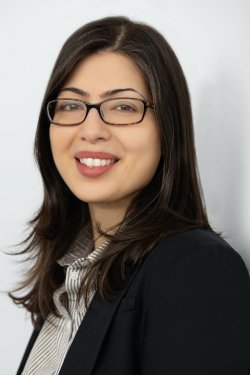Shruti Puri
2020 Regional Award Finalist — Post-Doc

Current Position:
Assistant Professor (previously, Postdoctoral Associate)
Institution:
Yale University
Discipline:
Atomic, Molecular & Optical Physics

Current Position:
Assistant Professor (previously, Postdoctoral Associate)
Institution:
Yale University
Discipline:
Atomic, Molecular & Optical Physics
Recognized for: Remarkable theoretical discoveries in quantum information storage and quantum computing. In quantum computing systems, error (noise) is an obstacle to accuracy. Puri’s rigorous theoretical and mathematical treatment of error led to the discovery of a completely new way of storing information in microwave photons (quanta of light), known as the Kerr-cat quantum bit. Puri’s discovery makes the path towards scalable quantum computing technologies truly possible, by tailoring the errors affecting the quantum bit in such a way that they become relatively easy to correct.
Areas of Research Interest and Expertise: Quantum Computing, Quantum Information Science, Quantum Optics, Quantum Error, Optimization
Previous Positions:
B. Tech., Indian Institute of Technology
PhD, Stanford University (Advisor: Yoshihisa Yamamoto)
Postdoctoral Associate, University of Sherbrooke (Advisor: Alexandre Blais)
Postdoctoral Associate, Yale University (Advisor: Steve Girvin)
Research Summary:
Shruti Puri, PhD, is a theoretical quantum physicist working at the forefront of the fields of quantum computing and quantum information science. Quantum computing technologies are regarded as the exciting next generation computer technology—an exponential leap in capability. However, this technology must take full advantage of key features in the quantum world and must also prove resilient against noise if they are ever going to outperform today’s best supercomputers.
Puri’s theoretical treatment of error (noise) in quantum computing systems blends ideas from quantum physics with methods from computer science in an effort to preserve the fragile ecosystems of the quantum world from noise. This noise is very similar to the type of noise we experience in a loud restaurant, making it hard to hear what our dining companion (or a quantum system) is trying to say. Puri’s research aims to make these quantum computing systems more robust in the face of noise, and her results to-date have yielded some of the most important breakthroughs in the field in over a decade.
Her landmark theoretical discovery of a new type of quantum bit (qubit) has established a completely new way to store information in quantum computers. This new type of quantum bit—widely known across the field as a Kerr-cat—stores information in microwave photons (quanta of light). This new type of quantum bit is tailored to be robust against most errors induced by the environment and the few remaining errors become relatively easy to correct. In addition, Dr. Puri’s discovery of the Kerr-cat quantum bit has led her to explore new areas of application for quantum computing, such as for solving combinatorial optimization problems which are ubiquitous across many disciplines. Her work in this area may one day provide researchers with appropriate computational tools to better understand the properties of defective proteins, and could lead to the treatment of progressive illnesses, like Alzheimer's disease.
As a young researcher, I felt the most inspired and empowered when I saw a female speaker leading discussions in a room full of male scientists. So I think it is very important to improve the visibility of the women and other underrepresented groups in science to promote diverse role models.
Key Publications:
S. Puri, S. Boutin, A. Blais. Engineering the quantum states of light in a Kerr-nonlinear resonator by two-photon driving. Nature Partner Journal, 2017.
S. Puri, C. K. Andersen, A. L. Grimsmo, A. Blais. Quantum annealing with all-to-all connected nonlinear oscillators. Nature Communications, 2017.
S. Puri, A. L. Grimsmo, A. Blais, C. K. Andersen. Quantum processor, and method of quantum processing. United States Patent No. US 10,262,276 B2, 2019.
Other Honors:
| 2010 | The Barbara Finberg Fellowship, Stanford University |
| 2008 | Sir Ratan Tata Trust Grant, Tata Trusts |